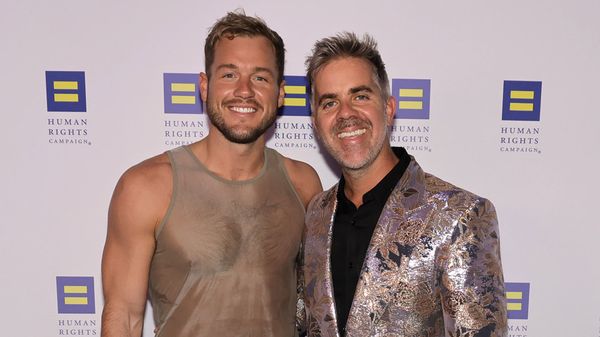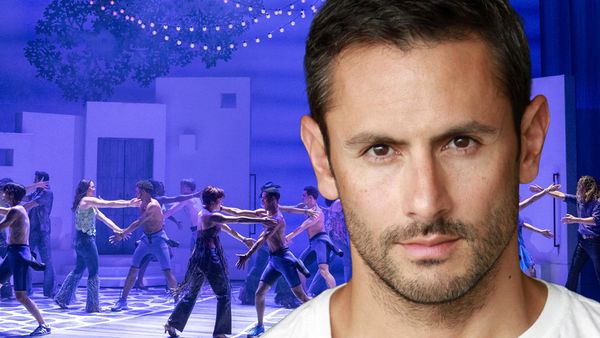November 18, 2016
Finding Empathy in Art: Kenneth Lonergan On 'Manchester by the Sea'
Greg Vellante READ TIME: 13 MIN.
"I like your sweater."
This was the first statement exchanged to me by writer/director Kenneth Lonergan as I sat down for our interview at the Ritz Carlton in Boston, MA. It was odd to receive an immediate compliment from the filmmaker, provided the cantankerous reputation that preceded him.
"It seems like I've accumulated so many sweaters over the past 20 years or so," he continued on, in a grumbly yet articulate inflection. "But I feel like I always just wear the same one over and over again."
Afterward, the conversation shifted to Lonergan's scheduled Q&A later that night at the IFF Boston screening and New England premiere of his latest film, "Manchester by the Sea." The film was slated to screen at the Coolidge Corner Theatre. I lauded the establishment as one of Boston's very best cinemas, and recollected the 12-hour Halloween Horror Marathon that had taken place there the weekend prior.
"Oh, what movies did they show?" Lonergan curiously asked.
I began to outline the titles. To each subsequent one, Lonergan offered a similar retort.
"Scream," "Scream 2"... "Nope."
..."The Fog"... "Nuh-uh."
..."The Howling"... "No thanks."
"Not for me," he elaborated. "I've seen "The Shining" so many times, but I just can't do those jump scares, or watch people trapped in a house with somebody after them trying to kill them."
"But "The Shining" is terrifying," I challenged back.
"It is terrifying. But "The Shining" is bizarre and surreal enough that it doesn't affect me in the same way," said Lonergan. "Those ones are just too real. If I can imagine it happening to me or somebody I love ... not for me."
Lonergan's distaste for certain horror films being "too real" fascinated me, considering he has built a career around cinema that erupts with piercing honesty, humanity and emotional realism. His first film, "You Can Count On Me" (released in 2000), was an achingly candid depiction of a sibling relationship, its brother and sister captured by Mark Ruffalo and Laura Linney. He followed this with Margaret (2011) - an epic, sweeping character study of a high school student named Lisa (Anna Paquin) dealing with the aftermath of a fatal bus accident for which she feels responsible.
Lonergan's third film is "Manchester by the Sea," about a Quincy janitor named Lee Chandler (Casey Affleck) who returns to his hometown of Manchester, MA after the death of his brother, Joe (Kyle Chandler). The fishing town carries much for Lee-painful memories, a reputation, an ex-wife (Michelle Williams). He must balance his grief and the life he left behind, all with the newfound responsibility of caring for Joe's teenage son, Patrick (Lucas Hodges).
Fascination with people
EDGE: Your films are very much about people-the feelings they have and how they deal with their experiences. What fascinates you about people?
Kenneth Lonergan: I don't know. They're all so different, and they're all conflicted, and they're all conflicted with each other. There's no end to it. But people also try very hard, and have so much love for each other, even when it doesn't hit right. I guess I'm interested in people who are different from myself, and what the world looks like to them. I'm very interested in people who are struggling and dealing with things they can't handle-things that are bigger than they are.
EDGE: Where does this fascination come from? Do you have any major influences in these regards? Artists? Figures of psychoanalysis?
Kenneth Lonergan: Yes, of course. My parents are psychoanalysts, actually, but I only think of that in terms of ... it may have pointed me in a direction of being interested in personalities and people and how they behave. But I have five brothers and sisters, and they're all doctors and lawyers-one's a scientist-and [this influence] didn't have any impact on them. So, I don't know if that really accounts to anything.
But there are so many sources of inspiration. I find music to be very inspiring. I love classical music. I like Philip Roth. I like Chekov. I like Paddy Chayefsky. I love old movies-30s, 40s, 50s, 60s, 70s-they're all very inspiring to me.
A shared experience
EDGE: Art is definitely inspirational, but it can also be an incredible passageway to empathy. I was watching the Extended Edition of "Margaret" recently, and was struck by its final scene. You have all these people at an opera, and you zero in on multiple faces as the orchestra begins and the curtains open up. I couldn't help but think, what are they bringing to this experience from their past and their emotions? My father passed away a few years ago, and it was impossible to not bring this with me to "Manchester by the Sea." And this will be true, in many different ways, for everyone watching the film. How do you think about this idea in terms of people watching your own art?
Kenneth Lonergan: Well, I hope so. I think that is one of the really beautiful things about art and about movies. One of my favorite things is to be at a play or a concert or a movie and, just, take a minute to look at the audience. All these heads are pointed in the same direction and everybody's sharing the same thing. Some people's minds may be wondering, as mine would be at that moment, but I love the idea that everyone-all over the world-is gathered to share in this experience, listen to the same story, participate in the same fantasy. It's a real connector. And it's a unique connector. And it's a really strong connector. It's so strong.
Like, a movie about people in a different time or place can really connect you to that time through what people have in common. And it also allows you to experience the things you don't have in common, that you'd never have an experience with otherwise. You can visit Italy, tour around and see churches, but if you watch an Italian movie about people who live in Italy-and it's a good movie-you're going to have some idea of what it's like to be Italian and what it's like to live in that town, be those people and live those lives. Not a complete version, but you'll get a much stronger connection to a completely different way of life. Any country, it works. Thailand. Japan. Cambodia. I just saw "Tampopo" again. You ever see that movie?
EDGE: Oh, yeah. Wonderful.
Kenneth Lonergan: It's hilarious and it's great. It's really original and really funny. And it's this crazy comedy about food in Japan. It's a knockoff of American westerns, and it's also its own thing, and it also makes fun of Japanese movies and culture, and it's also really sweet and romantic story. It's great. And it gives you something about someone's point of view who grew up in Japan.
Working with actors
EDGE: The experience of a film is, of course, enhanced by actors and their performance. How did you work with the cast of this film to achieve those performances? I think this is some of the best work of their careers.
Kenneth Lonergan: I agree. I feel they're extraordinary.
I like to rehearse. I try to rehearse for two weeks if I can, more if I can get it. This movie, I think we rehearsed between one week and two weeks, which is a lot for a movie. It's usually a scheduling issue. Everyone wants to rehearse, but it's hard to get everyone in the same room at the same time. But when we do, we sit around the table and go through the script and I never know what to do until I hear the actors reading the scene. Once they start reading the scenes, if something feels like there's a missed beat or nuance or flavor-I'll just say my thoughts and it's not meant to be a restriction. I consider it a jumping off point. You just start a dialogue about what's happening, not with the words but with the behavior between the two people in the scene. That just gets you started and you never stop. You take it all the way through rehearsal and into shooting.
When everything feels like it's going in a way that feels right to me, I don't say anything. Part of it is not saying too much. You're not there to give these long lectures to the actors. You hired them because they can act. You want them to do their thing, and you want them to bring their own ideas to bear. But you want to bring out the most human performance they can possibly deliver, if you can help them do that. Most of the time, they just don't need your help. Learning to shut up is the biggest challenge of being a director. Knowing when you're just not needed that much.
Making the emotional connection
EDGE: There are a lot of emotional moments in this film, and in somebody else's hands they could've been executed rather cheaply. You filmed this in a very unfussy manner, and you seem to really trust the viewer's intelligence. A lot of filmmakers don't do that.
Kenneth Lonergan: Yeah, I think so too. I just don't think people are that dumb. We don't need [obvious things] to happen. That is the expression of a nervous executive or a nervous writer who is worried that viewers aren't going to catch up. But they are. You basically have a dead stop when that happens. Actually, it's worse than a dead stop-you have a gilding of something that is actually interesting and moving. You basically kill whatever feeling there is. If something is being told to you and pointed out to you, telling you you're supposed to be getting all mushy about it, but none of that will actually happen. All that happens is your feeling dies. [Laughs]
EDGE: We don't need to be told how to feel.
Kenneth Lonergan: Yes. It's pretty heavy stuff that does happen in real life, and it's something to be respectful of. Not to milk and overdo. Not to rub people's face in it. Some of that stuff makes me really angry. Don't tell me to be upset or sad. It's sad all by itself. And I think people pick up on these things very quickly and easily. One note of tension in someone's voice and the whole atmosphere of a room can change. And everyone will hear it. And if you're looking at two people talking and you see that one of them is getting upset, but the other one doesn't notice, you start to get anxious. That's something that everybody is attune to, for the most part, and there's no need to go further. When you're explaining, you're explaining. When you're dramatizing, you're dramatizing. It's not the same thing.
Using music
EDGE: You mentioned earlier how music is inspirational to you, and this film makes excellent use of it. How do you go about choosing the pieces that go into your films?
Kenneth Lonergan: Music is just so important. It changes the tone of a scene completely. You can change the whole mood and the entirety of a film. I start by trying to find pieces that I like and I usually have some sense of the kind of pieces that I want. This movie continually resisted pieces that were too overtly sad. But other scenes required a real sense of sorrow. The funeral scene was Handel's "Messiah," and that's one of my favorites. It's a duet between an alto and a soprano, and I just love it. I find it to be incredibly moving and very, very beautiful. And it's very, very sad. But it's not just sad, and there's something that's very ethereal and strong about it that gives a certain flavor to the scene. I try to put pieces in that enhance the scene, not to just duplicate the action or telling you what the feeling of the scene is. It adds another layer to it-another perspective.
EDGE: I'm not going to lie, I cried so much at this film. But it's weird; because it's also the funniest film I've seen this year.
Kenneth Lonergan: [Laughs] Oh, that's very nice.
Balancing humor and drama
EDGE: How do you balance humor and tragedy? It felt so real, because you don't lose your sense of humor if something bad happens to you.
Kenneth Lonergan: No, you don't. Casey's character has a good sense of humor, and he's been through the worst thing anybody could ever go through. As long as he's not racked with his own difficulties, he's able to see where there's a joke in the room. Same goes for Patrick, [Lucas Hedges'] character.
Patrick is really funny. He's really sarcastic. He's really biting. He's really aware of how weird things are and he points them out. I feel like comedy and tragedy go hand in hand, there's really no dividing line. The funniest comedies to me are the ones that play it straight. "Tampopo," again, is a really great example. They play every single scene straight-they don't play it up, they don't wink at the audience. There's a really great scene where the main character has this big triumph, and it's really hilarious the way it's set up. She's shedding real tears and she's so happy, but the whole audience is laughing because it's so funny. They're the same thing. In fact, when people separate them you get a shriller comedy or a dourer drama.
EDGE: On the dramatic side, however, this is very much a film about grief. One of the most powerful lines of the film is Casey Affleck's character talking about his grief. He says, "I can't beat it." How do people beat it?
Kenneth Lonergan: I don't know. Honestly, I don't know how people get through what they get through. I think one thing that helps them is people who stick with them. Nobody can make it through the world without help from somebody else at some point. If they can, I don't know how they do it. There are some things you can't beat-you just have to live with them. That's where Casey's character is at. But the truth is, he's more alive at the end of the film than he was at the beginning. The kid cares about him and he cares about the kid, and that's the difference from how he is at the start of the film, where he's essentially doing everything he can to be a robot. He's not going to beat it, or get over it. I think that would be a really disrespectful lie.







